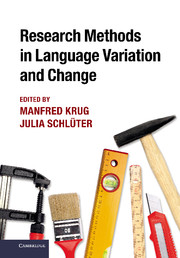Book contents
- Frontmatter
- Contents
- List of Figures
- List of Tables
- List of Contributors
- Preface
- Acknowledgements
- Introduction: Investigating language variation and change
- Part 1 Collecting empirical data
- Part 1.1 Fieldwork and linguistic mapping
- Part 1.2 Eliciting linguistic data
- Part 1.3 Alternatives to standard reference corpora
- 6 Using historical literature databases as corpora
- 7 Using the OED quotations database as a diachronic corpus
- 8 Using web-based data for the study of global English
- Part 2 Analysing empirical data
- Part 3 Evaluating empirical data
- Bibliography
- Index
- References
6 - Using historical literature databases as corpora
Published online by Cambridge University Press: 05 June 2014
- Frontmatter
- Contents
- List of Figures
- List of Tables
- List of Contributors
- Preface
- Acknowledgements
- Introduction: Investigating language variation and change
- Part 1 Collecting empirical data
- Part 1.1 Fieldwork and linguistic mapping
- Part 1.2 Eliciting linguistic data
- Part 1.3 Alternatives to standard reference corpora
- 6 Using historical literature databases as corpora
- 7 Using the OED quotations database as a diachronic corpus
- 8 Using web-based data for the study of global English
- Part 2 Analysing empirical data
- Part 3 Evaluating empirical data
- Bibliography
- Index
- References
Summary
Introduction
The present chapter introduces a set of historical literature collections (available on CD-ROM or online) and their use as historical corpora for linguistic research. Despite the fact that the evolution of the English language is documented in a considerable body of written texts and is remarkably well represented in historical corpora, studies of earlier stages of English often suffer from a serious lack of data. Indeed, for many quantitative questions, the field of historical linguistics is hindered by the limits of electronically stored, computer-readable material.
As a backdrop to the present chapter, the most important diachronic corpora of English will be used and compared with the literature databases (Section 2). Issues of the representativeness of fictional writing with regard to other historical registers of writing in English will also be addressed. As a next step, a few technical tips on the computer-assisted exploitation of literature collections will be given (Section 3). To illustrate their use as corpora, three example studies from widely disparate areas will be outlined, thereby aligning data from standard diachronic corpora with such from the literature databases under discussion (Section 4). In the conclusion, the advantages and disadvantages of their use as corpora will be summarized (Section 5).
- Type
- Chapter
- Information
- Research Methods in Language Variation and Change , pp. 119 - 135Publisher: Cambridge University PressPrint publication year: 2013
References
- 3
- Cited by



